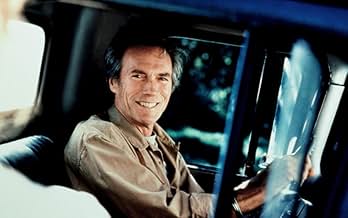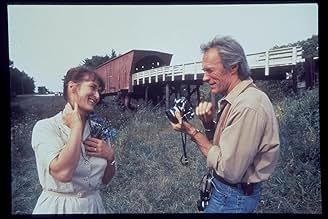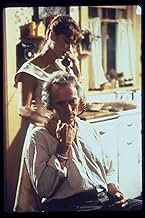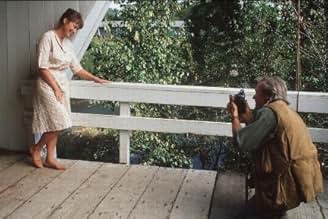O fotógrafo Robert Kincaid (Clint Eastwood) vagou pela vida da dona de casa Francesca Johnson (Meryl Streep) por quatro dias na década de 1960.O fotógrafo Robert Kincaid (Clint Eastwood) vagou pela vida da dona de casa Francesca Johnson (Meryl Streep) por quatro dias na década de 1960.O fotógrafo Robert Kincaid (Clint Eastwood) vagou pela vida da dona de casa Francesca Johnson (Meryl Streep) por quatro dias na década de 1960.
- Direção
- Roteiristas
- Artistas
- Indicado a 1 Oscar
- 8 vitórias e 19 indicações no total
Sarah Zahn
- Young Carolyn
- (as Sarah Kathryn Schmitt)
Tania Burt
- Waitress #1
- (as Tania Mishler)
- Direção
- Roteiristas
- Elenco e equipe completos
- Produção, bilheteria e muito mais no IMDbPro
Avaliações em destaque
When the soul of a movie is reflected in an actor's eyes then you have a miracle, you have something that's going to last. Meryl Streep in "The Bridges Of Madison County" is such a miracle to me. I never thought for a moment that she, no matter how wonderful an actress she is, could fool me. Meryl Streep could never be Italian. Well, there I was, thinking and pre-judging like people I detest. I was so wrong. Not just because she fooled me, although there is no fooling involved here. She won me over. I forgot she was Meryl Streep, the actress, and I lived Francesca's story to the fullest because, I suppose, that's the mystery of great acting, I was confronted by her sheer undiluted truth. The truth in her eyes in every one of her gestures. The truth on her brow. Her thinking, transparent. Clint Eastwood does the right thing putting the entire film at her service and placing himself as the foil to liberate that powerful latent side of Francesca. I though it was ironic and I'm not sure if was meant to be that a wonderful woman like Francesca will sacrifice, what could arguably be call the love of her life, for those children. The grown children's mediocrity was kind of shocking to me. Will the revelation of their mother's secret, reveal a latent, greater side to their natures. I hope so. Francesca deserved extraordinary children. Try no to miss this little miracle.
On the page "The Bridges of Madison County" often read like a reject from Mills and Boon and yet it was tremendously popular. People who normally wouldn't read this sort of thing were not only reading it but quoting it. You could say that for some people it held the kind of camp appeal that bad books sometimes do for the so-called intelligentsia. Personally, I am inclined to think that its tale of middle-aged romance struck a cord. It may not have been well-written but many people recognized in its two central characters a reflection of themselves. It spoke of a great passion and a great loss; a "Brief Encounter" for the nineties. Still, it never quite seemed like a vehicle for Clint Eastwood; (once upon a time you might have envisaged Arthur Hiller doing it), yet here it is, larger than life on the big screen and utterly lovely, utterly heart-breaking.
Perhaps Eastwood chose to film it as a vehicle for himself. He wears the mantle of the ageing Lothario perfectly at an age when most romantic leads are played by much younger men, (or are simply non-existent), yet who blanched when Gary Cooper or Cary Grant were wooing Audrey Hepburn well into their old age. Admittedly Eastwood isn't entirely comfortable in this sort of role. He's not a versatile actor. His best performances have been as tortured losers or just old-fashioned tough guys but under his own direction he blossoms here. Of course, the 'romantic' in Eastwood has never been hard to find. You need look only to the scores he has composed. (He has written the main love theme here and his use of classic jazz standards by the likes of Dinah Washington and Johnny Hartman adds considerably to the film's beating heart).
What is remarkable is that essentially Eastwood's film is really something of a chamber piece for two players. A few other characters flit into the frame but for most of the time there is no one on screen but Eastwood and co-star Meryl Streep and this is one of Streep's great performances. As Francesca, the woman who finds in Eastwood's photographer Robert the one great passion in her life albeit briefly and at a time when the likelihood of such a thing happening was remote indeed, Streep is extraordinary. Sometimes Streep can overwhelm a project; her versatility doesn't always work in favour of lesser material. But here she seems to have tapped quite effortlessly, not just into the consciousness of her character, but into her very soul as well. And if that sounds cheesy, let me assure you it isn't. Cheesiness isn't in Streep's vocabulary, even if it is in mine! Perhaps Eastwood was able to discern in Robert James Waller's novel the seeds of a great love story or perhaps he just felt he could bring his artistry to bear on some unlikely source material. Whatever, it's paid off. On screen "The Bridges of Madison County" is a great love story; there won't be a dry eye in the house.
Perhaps Eastwood chose to film it as a vehicle for himself. He wears the mantle of the ageing Lothario perfectly at an age when most romantic leads are played by much younger men, (or are simply non-existent), yet who blanched when Gary Cooper or Cary Grant were wooing Audrey Hepburn well into their old age. Admittedly Eastwood isn't entirely comfortable in this sort of role. He's not a versatile actor. His best performances have been as tortured losers or just old-fashioned tough guys but under his own direction he blossoms here. Of course, the 'romantic' in Eastwood has never been hard to find. You need look only to the scores he has composed. (He has written the main love theme here and his use of classic jazz standards by the likes of Dinah Washington and Johnny Hartman adds considerably to the film's beating heart).
What is remarkable is that essentially Eastwood's film is really something of a chamber piece for two players. A few other characters flit into the frame but for most of the time there is no one on screen but Eastwood and co-star Meryl Streep and this is one of Streep's great performances. As Francesca, the woman who finds in Eastwood's photographer Robert the one great passion in her life albeit briefly and at a time when the likelihood of such a thing happening was remote indeed, Streep is extraordinary. Sometimes Streep can overwhelm a project; her versatility doesn't always work in favour of lesser material. But here she seems to have tapped quite effortlessly, not just into the consciousness of her character, but into her very soul as well. And if that sounds cheesy, let me assure you it isn't. Cheesiness isn't in Streep's vocabulary, even if it is in mine! Perhaps Eastwood was able to discern in Robert James Waller's novel the seeds of a great love story or perhaps he just felt he could bring his artistry to bear on some unlikely source material. Whatever, it's paid off. On screen "The Bridges of Madison County" is a great love story; there won't be a dry eye in the house.
I only managed about two pages of the book before feeling physically ill by the trite dialogue, heavy dependence on cliche and ham fisted, adolescent romance prose style. So a film of the book 'The Bridges of Madison County' did not fill me with joy and pleasureable anticpation.
Yet Clint Eastwood has waved a magic wand, and worked wonders on the lack lustre source material, by pairing it down to produce a beautiful, warm film with only one real flaw (more on that later)
The film's overwhelming main strength is the casting of Meryl Streep. As Francesca she dissolves into the role - at times her gestures and dialogue seem so natural and unforced it is as if Eastwood had installed a fly-on-the-wall camera into the house of a real Iowan housewife. She lifts the film - which does centre on themes which could appear trite in the wrong hands - to the level of profound piece of art. Her selflessness and devotion to her family, and tortured sense of divided loyalites are presented so powerfully, and so plausibly, that the final scene in the car at the end (those who've seen it will recall immediately what I mean) pulls at your emotions so hard you'd swear it was you who was making the decision. I defy anyone with a pulse not to shed copious amounts of tears at this point --- you would have to have a heart of stone not to be moved on some level by this great, great performance.
Clint Eastwood provides good, solid support in the sense that he doesn't overact, and allows Meryl to become the heart of the film. This is a wise decision - part of the terrible weakness of the book was its dependence upon the inane thoughts and ramblings of Robert Kincaid. The film is beautifully directed, beautifully photograhed and beautifully scored - the radio tunes and the non-diegetic Bridges Love theme really enhance the romantic, lush tone and mood of the film.
My only problem is with the misguided decision to cast Francesca's older children and flash back periodically to them reading through their Mother's journals. The acting in these parts is mediocre at best, and they detract from the elegance and poignant mastery of Meryl Streep's central performance. The ashes scene at the end is - I feel - necessary for closure, but the rest of the scenes featuring the chldren should have been scrapped. The Francesca and Robert sections stand alone and require no interruption - these other segments cheapen the mastery of Meryl.
Above all, this is a film which (on paper) can be dismissed as pure soap opera. But it transcends these potentially trite themes to make a universal story of love, selflessness, devotion and choice, that speaks eloquently to the viewer, no matter what your age or experience. It's a truly heartbreaking tale of transitory experience and the power of memory. It will make you think about your own life, and about your closest family members and relationships.
And its finest quality has to be the magic of Meryl Streep who proves, yet again, why she is uniquely the best actress we have ever had. As Clint Eastwood said about casting this role: 'I only made one phonecall'. He knew as you will too - no other actress could have brought so much depth, warmth, beauty, charisma and humanity to this character. As a humble film lover, it's all I can do to applaud her from the depths of my heart. Bravo, Queen Meryl!
Yet Clint Eastwood has waved a magic wand, and worked wonders on the lack lustre source material, by pairing it down to produce a beautiful, warm film with only one real flaw (more on that later)
The film's overwhelming main strength is the casting of Meryl Streep. As Francesca she dissolves into the role - at times her gestures and dialogue seem so natural and unforced it is as if Eastwood had installed a fly-on-the-wall camera into the house of a real Iowan housewife. She lifts the film - which does centre on themes which could appear trite in the wrong hands - to the level of profound piece of art. Her selflessness and devotion to her family, and tortured sense of divided loyalites are presented so powerfully, and so plausibly, that the final scene in the car at the end (those who've seen it will recall immediately what I mean) pulls at your emotions so hard you'd swear it was you who was making the decision. I defy anyone with a pulse not to shed copious amounts of tears at this point --- you would have to have a heart of stone not to be moved on some level by this great, great performance.
Clint Eastwood provides good, solid support in the sense that he doesn't overact, and allows Meryl to become the heart of the film. This is a wise decision - part of the terrible weakness of the book was its dependence upon the inane thoughts and ramblings of Robert Kincaid. The film is beautifully directed, beautifully photograhed and beautifully scored - the radio tunes and the non-diegetic Bridges Love theme really enhance the romantic, lush tone and mood of the film.
My only problem is with the misguided decision to cast Francesca's older children and flash back periodically to them reading through their Mother's journals. The acting in these parts is mediocre at best, and they detract from the elegance and poignant mastery of Meryl Streep's central performance. The ashes scene at the end is - I feel - necessary for closure, but the rest of the scenes featuring the chldren should have been scrapped. The Francesca and Robert sections stand alone and require no interruption - these other segments cheapen the mastery of Meryl.
Above all, this is a film which (on paper) can be dismissed as pure soap opera. But it transcends these potentially trite themes to make a universal story of love, selflessness, devotion and choice, that speaks eloquently to the viewer, no matter what your age or experience. It's a truly heartbreaking tale of transitory experience and the power of memory. It will make you think about your own life, and about your closest family members and relationships.
And its finest quality has to be the magic of Meryl Streep who proves, yet again, why she is uniquely the best actress we have ever had. As Clint Eastwood said about casting this role: 'I only made one phonecall'. He knew as you will too - no other actress could have brought so much depth, warmth, beauty, charisma and humanity to this character. As a humble film lover, it's all I can do to applaud her from the depths of my heart. Bravo, Queen Meryl!
The family of Francesca Johnson (Meryl Streep) is dealing with her final wish after her death. She wants to be cremated and her ashes scattered from Roseman Bridge. They discover pictures taken in 1965 and her emotional affair with famed National Geographic photographer Robert Kincaid (Clint Eastwood) whose ashes were scattered from the bridge. Her kids read her accounts of those four days. Her family went to the Illinois state fair. Robert was on assignment to film the bridge and stopped to ask directions from Italian war bride Francesca.
It's a simple bittersweet story. Director Clint Eastwood doesn't add anything overtly melodramatic. Meryl Streep is pitch-perfect. She's an expert on calibrating her accents but it's her every simple gesture that is so precise. She could teach an acting class from this movie. The story is basically laid out in the first ten minutes before either Streep or Eastwood is even on the screen. That is its most obvious drawback. It's not a movie of twists and mysteries. It is however a movie of emotional depth and her children are a big part of it.
It's a simple bittersweet story. Director Clint Eastwood doesn't add anything overtly melodramatic. Meryl Streep is pitch-perfect. She's an expert on calibrating her accents but it's her every simple gesture that is so precise. She could teach an acting class from this movie. The story is basically laid out in the first ten minutes before either Streep or Eastwood is even on the screen. That is its most obvious drawback. It's not a movie of twists and mysteries. It is however a movie of emotional depth and her children are a big part of it.
A classic romantic movie. It has a "parting scene" between the couple that is so beautiful that it deserves a place in movie history. I will never forget the sight of Clint standing in the rain.
Você sabia?
- CuriosidadesDuring the argument in the kitchen, Robert cries a little bit and turns his back to the camera, so we don't see him. When shooting the scene, Meryl Streep asked Clint Eastwood why he was filming it like that, if by doing so he was missing the opportunity to shine as an actor. Eastwood replied that the scene worked better without seeing Robert cry directly. Streep was then amazed and had praised the director's talent for thinking more about the moment, than his chance to shine as an actor.
- Erros de gravaçãoWhen Francesa and Robert are standing in the kitchen one night, the kitchen window over the sink shows it is dark outside. The camera swings to a shot of the refrigerator and in the background is a window but instead of being dark it is daylight outside.
- Citações
Robert Kincaid: This kind of certainty comes but just once in a lifetime.
- Trilhas sonorasDoe Eyes (Love Theme from 'The Bridges Of Madison County')
Composed by Lennie Niehaus and Clint Eastwood
Conducted by Lennie Niehaus
Piano solo performed by Michael Lang
Principais escolhas
Faça login para avaliar e ver a lista de recomendações personalizadas
- How long is The Bridges of Madison County?Fornecido pela Alexa
Detalhes
- Data de lançamento
- País de origem
- Centrais de atendimento oficiais
- Idioma
- Também conhecido como
- Los Puentes de Madison
- Locações de filme
- Empresas de produção
- Consulte mais créditos da empresa na IMDbPro
Bilheteria
- Orçamento
- US$ 24.000.000 (estimativa)
- Faturamento bruto nos EUA e Canadá
- US$ 71.516.617
- Fim de semana de estreia nos EUA e Canadá
- US$ 10.519.257
- 4 de jun. de 1995
- Faturamento bruto mundial
- US$ 182.016.617
- Tempo de duração2 horas 15 minutos
- Cor
- Mixagem de som
- Proporção
- 1.85 : 1
Contribua para esta página
Sugerir uma alteração ou adicionar conteúdo ausente





































